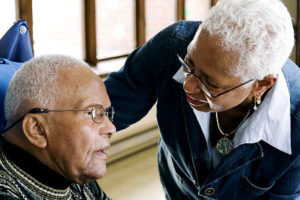Studies show that racism could be yet another reason why older African Americans are much more likely to develop Alzheimer’s disease than their white counterparts, but the history of clinical studies involving African-American participants has discouraged many from taking part in modern research.
The reality of Alzheimer’s disease isn’t something many Black families discuss, even after a loved one starts to show symptoms of the dreaded illness. But more studies are suggesting that this stigma needs to be banished immediately.
“You just don’t hear about Alzheimer’s in the Black community,” said Stephanie Monroe, associate director of the African-American network at the D.C.-based nonprofit USAgainstAlzheimer’s, according to the Washington Post.
Studies suggest that the number of Americans living with Alzheimer’s could double by 2050 and with Black people being at higher risk for being a part of that population, it’s key that they become more engaged in finding out more about the disease.
What medical experts have already revealed is that there could actually be a connection between racism and developing Alzheimer’s.
Researchers suggest that the stress many Black people encounter from discrimination could be a stressor that contributes to the development of Alzheimer’s.
There are still many more studies that need to follow in order to confirm the theory but the way racism has plagued American institutions could also be at fault for the high rates of elderly Blacks with the disease.
Systems that have led to increased poverty and poor education in urban neighborhoods are setting African-Americans up to become likely candidates to develop Alzheimer’s.
Black people are much more likely to develop diabetes, hypertension and cardiovascular disease and, according to some researchers, those illnesses also contribute to the development of Alzheimer’s later down the road.
“It’s clear that these issues are related to poverty,” said Laurie M. Ryan, chief of the Dementias of Aging Branch in the National Institute on Aging’s neuroscience division.
Then there is the matter of education.
“Early education has a profound effect on our cognitive function throughout your entire life,” Jennifer Manly, a neurology professor at the Taub Institute for Research on Alzheimer’s Disease and the Aging Brain at Columbia University Medical Center, told the Washington Post. “And it turns out to have a profound effect on your risk for cognitive decline and developing Alzheimer’s disease.”
Many urban school districts with predominantly Black student bodies have long struggled to obtain the resources that would allow children to perform as well as students do in private schools or predominantly white schools with more financial backing.
Socioeconomic factors are not the only reasons Blacks are more likely to develop Alzheimer’s.
Black people are considered at higher risk for the disease even when nothing else other than genetics is taken into consideration.
Blacks were found to be about 1.4 times more likely than their white counterparts to carry a gene variant called apolipoprotein E (APOE).

More recently another gene was discovered that is believed to raise the risk of Alzheimer’s – ABCA7.
This gene also has been found at higher rates in African-Americans.
With so many factors making Black people more likely to develop the disease, it may come as a surprise that many Blacks aren’t willing to participate in clinical research.
A quick look at the history of many clinical studies conducted with a focus on Blacks, however, seems to validate the community’s fears.
Back in 1932 the federal government enlisted roughly 400 low-income Black men who were suffering from syphilis.
At no point were the men informed about treatment options, which left many of the men untreated after penicillin had already become available.
The list of clinical studies that mistreated Black participants or left them uninformed about key information regarding the study is extensive and it has led to a lack of trust between researchers and the Black community.
“I think for very good reasons in minority communities there is distrust of clinical trials,” said Reisa A. Sperling, a Harvard Medical School neurology professor and director of Alzheimer’s research at Brigham and Women’s Hospital.
Even more recently, a CDC whistleblower revealed that parents of Black children might have been uninformed that some experimental measles vaccines that were given to thousands of Black children actually increased their likelihood of getting autism.
While researchers expect the fear of clinical studies to persist, they are hoping that Alzheimer’s will at least become a more prevalent discussion in the Black community.



